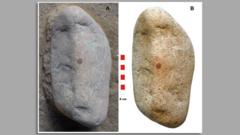In a groundbreaking announcement, archaeologists have disclosed key findings from the Melsonby Hoard, one of the most notable archaeological discoveries in northern England's history. This significant collection stems from an initial discovery in December 2021 by amateur metal detectorist Peter Heads, who alerted Tom Moore, head of archaeology at Durham University, about his find, speculating on its Iron Age origins.
For over three years, a dedicated team of archaeologists operated in secrecy at the excavation site near Melsonby, meticulously cataloging more than 800 artifacts that predominantly date back to the Iron Age—an era spanning around 2,000 years ago. Among the artifacts are remarkable items such as cauldrons, a wine-mixing bowl, intricately designed horse harnesses, ceremonial spears, and notably, 28 iron wheels believed to have belonged to a chariot or wagon, a stunning discovery that suggests advanced transportation methods for Britain’s Iron Age elites.
According to Duncan Wilson, chief executive of Historic England, this finding not only enriches the understanding of Iron Age life in Britain but also highlights connections with mainland Europe, shedding new light on the era's cultural and social dynamics.
This revelation has sparked excitement within the archaeological community and among historians, as the artifacts unveil a wealth of new information about the complexities of life during the Iron Age, potentially altering long-held notions about the period in the U.K. and beyond.




















